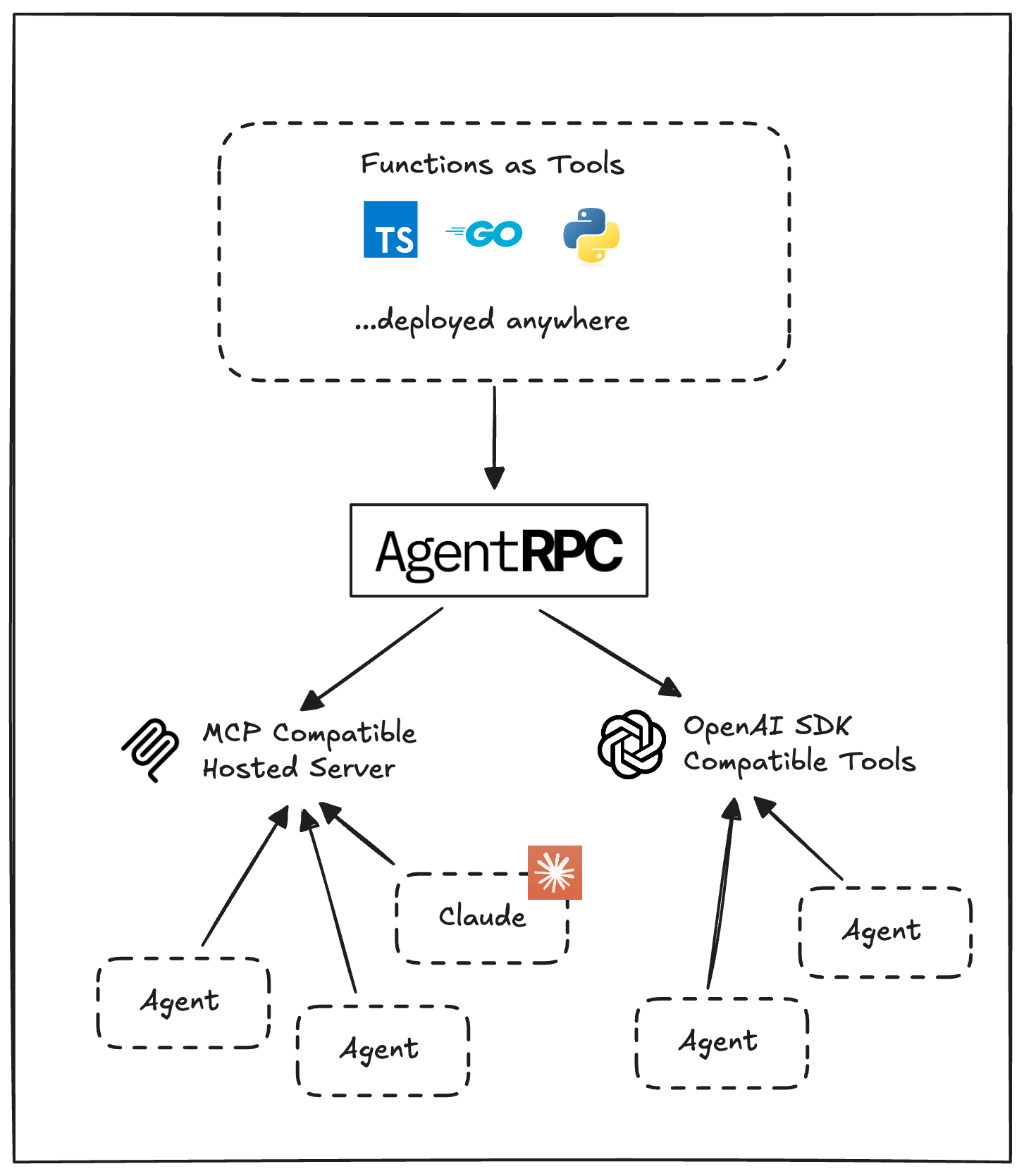- Explore MCP Servers
- agentrpc
AgentRPC
What is AgentRPC
AgentRPC is a universal RPC layer designed for connecting functions across different programming languages and network boundaries. It enables seamless interactions with services deployed in private VPCs, Kubernetes clusters, or multiple cloud environments, making it suitable for AI agent integrations.
Use cases
AgentRPC is ideal for scenarios where functions need to be registered in private networks, such as enterprises with strict security requirements, or for long-running processes that exceed typical HTTP timeouts. It also supports monitoring and managing function health, making it versatile for cloud deployments.
How to use
To get started with AgentRPC, users can follow the quick start guide available on the documentation site. Functions can be registered using the SDK across various programming languages, and users can interact with the MCP server to connect their tools with AI agents.
Key features
Key features of AgentRPC include multi-language support (TypeScript, Go, Python, and upcoming .NET), private network functionality with no open ports necessary, long polling SDKs for extended function calls, full observability through tracing and metrics, automatic failover for health tracking, and compatibility with MCP and OpenAI SDKs.
Where to use
AgentRPC is suitable for deployment scenarios in private VPCs, Kubernetes clusters, and various cloud environments. It’s particularly useful for integrating AI tools, ensuring reliable communications and function access while maintaining security and compliance.
Overview
What is AgentRPC
AgentRPC is a universal RPC layer designed for connecting functions across different programming languages and network boundaries. It enables seamless interactions with services deployed in private VPCs, Kubernetes clusters, or multiple cloud environments, making it suitable for AI agent integrations.
Use cases
AgentRPC is ideal for scenarios where functions need to be registered in private networks, such as enterprises with strict security requirements, or for long-running processes that exceed typical HTTP timeouts. It also supports monitoring and managing function health, making it versatile for cloud deployments.
How to use
To get started with AgentRPC, users can follow the quick start guide available on the documentation site. Functions can be registered using the SDK across various programming languages, and users can interact with the MCP server to connect their tools with AI agents.
Key features
Key features of AgentRPC include multi-language support (TypeScript, Go, Python, and upcoming .NET), private network functionality with no open ports necessary, long polling SDKs for extended function calls, full observability through tracing and metrics, automatic failover for health tracking, and compatibility with MCP and OpenAI SDKs.
Where to use
AgentRPC is suitable for deployment scenarios in private VPCs, Kubernetes clusters, and various cloud environments. It’s particularly useful for integrating AI tools, ensuring reliable communications and function access while maintaining security and compliance.
Content
AgentRPC



Universal RPC layer for AI agents across network boundaries and languages
Overview
AgentRPC allows you to connect to any function, in any language, across network boundaries. It’s ideal when you have services deployed in:
- Private VPCs
- Kubernetes clusters
- Multiple cloud environments
AgentRPC wraps your functions in a universal RPC interface, connecting them to a hosted RPC server accessible through open standards:
- Model Context Protocol (MCP)
- OpenAI-compatible tool definitions (OpenAI, Anthropic, LiteLLM, OpenRouter, etc.)

How It Works
- Registration: Use our SDK to register functions and APIs in any language
- Management: The AgentRPC platform (api.agentrpc.com) registers the function and monitors its health
- Access: Receive OpenAPI SDK compatible tool definitions and a hosted MCP server for connecting to compatible agents
Key Features
| Feature | Description |
|---|---|
| Multi-language Support | Connect to tools in TypeScript, Go, Python and .NET (coming soon) |
| Private Network Support | Register functions in private VPCs with no open ports required |
| Long-running Functions | Long polling SDKs allow function calls beyond HTTP timeout limits |
| Full Observability | Comprehensive tracing, metrics, and events for complete visibility |
| Automatic Failover | Intelligent health tracking with automatic failover and retries |
| Framework Compatibility | Out-of-the-box support for MCP and OpenAI SDK compatible agents |
Getting Started
Quick Start
Follow the quick start example on our docs site.
Examples
Explore working examples in the examples directory.
MCP Server
The AgentRPC TypeScript SDK includes an optional MCP (Model Context Protocol) server.
ANGENTRPC_API_SECRET=YOUR_API_SECRET npx agentrpc mcp
This launches an MCP-compliant server for external AI models to interact with your registered tools.
Claude Desktop Integration
Add to your claude_desktop_config.json:
{
"mcpServers": {
"agentrpc": {
"command": "npx",
"args": [
"-y",
"agentrpc",
"mcp"
],
"env": {
"AGENTRPC_API_SECRET": "<YOUR_API_SECRET>"
}
}
}
}Cursor Integration
Add to your ~/.cursor/mcp.json:
{
"mcpServers": {
"agentrpc": {
"command": "npx",
"args": [
"-y",
"agentrpc",
"mcp"
],
"env": {
"AGENTRPC_API_SECRET": "<YOUR_API_SECRET>"
}
}
}
}License
This project is licensed under the Apache License 2.0 - see the LICENSE file for details.
This repository contains all the open-source components and SDKs for AgentRPC.

